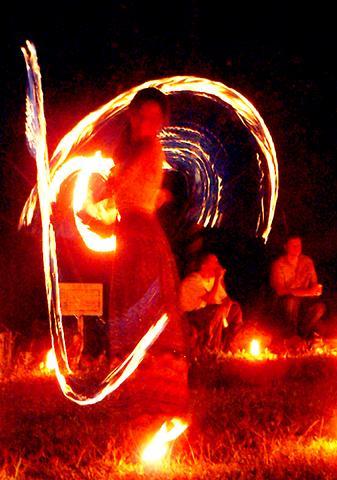`Hoping for Hoping' might seem a hopeless name for an organization until you learn that the second "hoping" (和平) is actually the Romanization of "peace" in Chinese and that the group is one of the founding members of Taiwan's nascent peace movement.
Their hope is that tomorrow, all peaceable-minded people will turn out for a gathering in Taichung complete with food, drinks and music from 15 local bands. Admission is NT$300 and all proceeds go to local charities.

PHOTO COURTESY OF HOPING FOR HOPING
Jindowin, .22, Dakanow, Milk, Dahai, Anglers, Mandala, Schlumpy, The Deported, Chicken Rice, Boosie Chillin, Rocket Girl!, Robin Dale, Wise Maneouvers, and Blacksummerdaycamp will all take the stage of the Night Sky Outdoor BBQ starting at 2pm with an after party featuring DJs from Chi Funk and the rhymes of Elementality.
"Peace," says organizer Dave Nichols. Hoping for Hoping was founded last year by a group consisting mostly of foreign residents of Taiwan opposed to the US' invasion of Iraq. They met with several like-minded locals and drew some 300 people to a protest rally on the steps of the American Institute in Taiwan last February.
Hsia Chu-joe (夏鑄九), a professor at National Taiwan University and long-time political activist, was among them. He offered a history lesson on Taiwan's peace movement.
"After the lifting of martial law, besides the movement for democracy, there were others, such as the labor movement, the farmers' movement, student movement, womens' movement, gay and lesbian movement and the environmental movement, including people opposed to nuclear power," Hsia said. "We were called the pian di kai hua (
Following that rally, Hoping for Hoping held their first peace rally in Taoyuan County, with many of the same musical acts that will be performing at this year's event.
Night Sky BBQ is located at 199, Chung Gang Road, Taichung (

Three big changes have transformed the landscape of Taiwan’s local patronage factions: Increasing Democratic Progressive Party (DPP) involvement, rising new factions and the Chinese Nationalist Party’s (KMT) significantly weakened control. GREEN FACTIONS It is said that “south of the Zhuoshui River (濁水溪), there is no blue-green divide,” meaning that from Yunlin County south there is no difference between KMT and DPP politicians. This is not always true, but there is more than a grain of truth to it. Traditionally, DPP factions are viewed as national entities, with their primary function to secure plum positions in the party and government. This is not unusual

Mongolian influencer Anudari Daarya looks effortlessly glamorous and carefree in her social media posts — but the classically trained pianist’s road to acceptance as a transgender artist has been anything but easy. She is one of a growing number of Mongolian LGBTQ youth challenging stereotypes and fighting for acceptance through media representation in the socially conservative country. LGBTQ Mongolians often hide their identities from their employers and colleagues for fear of discrimination, with a survey by the non-profit LGBT Centre Mongolia showing that only 20 percent of people felt comfortable coming out at work. Daarya, 25, said she has faced discrimination since she

April 21 to April 27 Hsieh Er’s (謝娥) political fortunes were rising fast after she got out of jail and joined the Chinese Nationalist Party (KMT) in December 1945. Not only did she hold key positions in various committees, she was elected the only woman on the Taipei City Council and headed to Nanjing in 1946 as the sole Taiwanese female representative to the National Constituent Assembly. With the support of first lady Soong May-ling (宋美齡), she started the Taipei Women’s Association and Taiwan Provincial Women’s Association, where she

More than 75 years after the publication of Nineteen Eighty-Four, the Orwellian phrase “Big Brother is watching you” has become so familiar to most of the Taiwanese public that even those who haven’t read the novel recognize it. That phrase has now been given a new look by amateur translator Tsiu Ing-sing (周盈成), who recently completed the first full Taiwanese translation of George Orwell’s dystopian classic. Tsiu — who completed the nearly 160,000-word project in his spare time over four years — said his goal was to “prove it possible” that foreign literature could be rendered in Taiwanese. The translation is part of